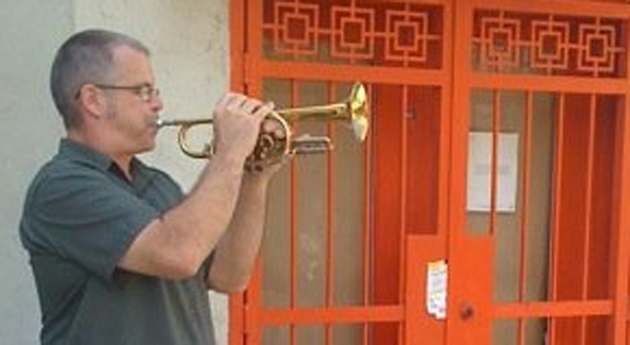
Photo by Cindy Bernard
Legendary local experimental guitarist and man about town, Scott Heustis, has been organizing a stellar music series, named ‘Be Here Now” by Gastby Books owner Sean Moor. The series, which takes place at Gatsby Books every first Saturday at 5 PM, has featured musical luminaries from all over Southern California. Heustis, a well regarded improviser in his own right, has naturally tapped into the widely varied improv scene that flourishes throughout the L.A. area.
This Saturday is no exception. He invited the massively talented and musically adventurous electric bassist, Steuart Liebig, to assemble an ensemble, which includes Dan Clucas on cornet, Mark Weaver on tuba, and Rich West on drums. The four have all worked together in one way or another, but never in this specific grouping.
Clucas is an in-demand player and a popular improviser. That all began with the discovery of Dizzie Gillespie.
“I started getting interested in jazz that pushes the envelope soon after becoming interested in jazz in general, starting with Dizzy Gillespie. I was also into prog and punk and 20th Century concert music and you name it. It wasn’t long before Ornette [Coleman] and Albert Ayler and Sun Ra started predominating.
“Richard Wood, the great alto saxophonist, was the first person I met during that time who really represented the L.A. avant garde to me. We started playing and I began to meet other musicians on the scene like Rich West and Bonnie Barnett. It was a great time.”
Clucas is part of that L.A. avant garde, many who can be found on Jeff Gauthier’s Cryptogramophone record label, including Liebig, Nels and Alex Cline, G.E. Stinson, and David Witham.
“It’s just great to have like-minded people to let you know that you may be crazy, but we’re all crazy together! Without those people we’d be lost. For me, it’s mainly on the level of having musicians around me who aren’t afraid to improvise, and by that I mean come to the table with no mutual preconceptions.
“We all have materials that we’ve built into personal vocabularies but many musicians aren’t comfortable with simply sharing their palette in the moment. I tend to get discouraged when I come to a situation that I’ve been led to believe is an improvised one, and it really isn’t because people want to set down all these ground rules first. That’s fine if you knew what you were getting into in the first place.
“As a composer, I really dig having musicians who will take the material and run with it. I kind of like the image of the composer dangling a sheet of music over a tank full of piranhas. Of course I’m going to exert a certain influence over the shape of the material, but I want what the other musicians have to say to be part of that shape.”
Clucas’ personal vocabulary has developed from listening.
“It comes from a lot of places, not just music, and I think that’s really how it should be. Over the years I’ve certainly been influenced by everything from Louis Armstrong to Charlie Parker to Xenakis to Cage to Merzbow, and I’m profoundly influenced by silence. But my personal aesthetic really has remained true to the language of bop, as exemplified by Ornette Coleman and Jimmy Lyons. Ornette took it and ran simultaneously forward and back to the roots with it, whereas Jimmy, for all his perceived abstraction, really is a true disciple of Charlie Parker. I figured out that that’s kind of where I sit too. But as far as the shape of my lines, I’m influenced by the constellations, the galaxies, the pattern of cracks in the sidewalk, and trees. Plant life in general really gets me thinking about music.
“Starting with physical shape, the representation within a living body of every possible geometric form, the kinetic quality of plants and trees as they move in the sunlight, and then of course on a metaphoric level, as life systems which convert old information into new information. Musicians have to be in tune with the planet, and plant life is kind of a direct conduit between it and us. Thus tree-hugging!”
The somewhat unusual pairing of bass and tuba in a quartet is something Clucas likes.
“Bill Dixon used to do that: Two, sometimes three basses, and then he’d add a tuba! It’s sort of that feeling of sensations coming up from the ground, out of the earth. See, we’re back to plants already!
“I’m always happy to get to play with Mark, partly because we’re very close but he lives in Albuquerque and I’m here. I have a long history of playing with both Rich and Steuart but, to the best of my recollection, I’ve never played with both of them in the same band. Needless to say I’m stoked about this gig.”
Long Beach bassist Anthony Shadduck has worked with Clucas, and offered some insight into why Dan is in demand.
“He’s a cool guy,” Shadduck said, “with a great sense of humor, and he’s very musical in his approach to the horn. Lyrical lines, great tone, not over saturated with choppy high register bangs and whistles like a lot of players. He’s plays what he means, and he means it.”
Steuart Liebig sums up Clucas’ talent more simply.
“He’s badass,” Liebig exclaimed, “and he listens!”
Clucas, however, remains skeptical.
“They’re all liars.”
Gatsby Books is located at 5535 E Spring Street. For more information about upcoming events there, visit GatsbyBooks.com.
Learn more about Dan at DanClucas.BandCamp.com.
Learn more about Steuart’s impressive body of work at StigSite.com.
Rich West is the owner of Battery Books in Pasadena.
Both Mark Weaver and Dan Clucas are on Plutonium Records. Jazz.com has a nice overview of Mark’s career.
A nice compendum of information about Scott Heustis can be found at ScottHeustis.tk.
{FG_GEOMAP [33.8106133,-118.12452919999998] FG_GEOMAP}

